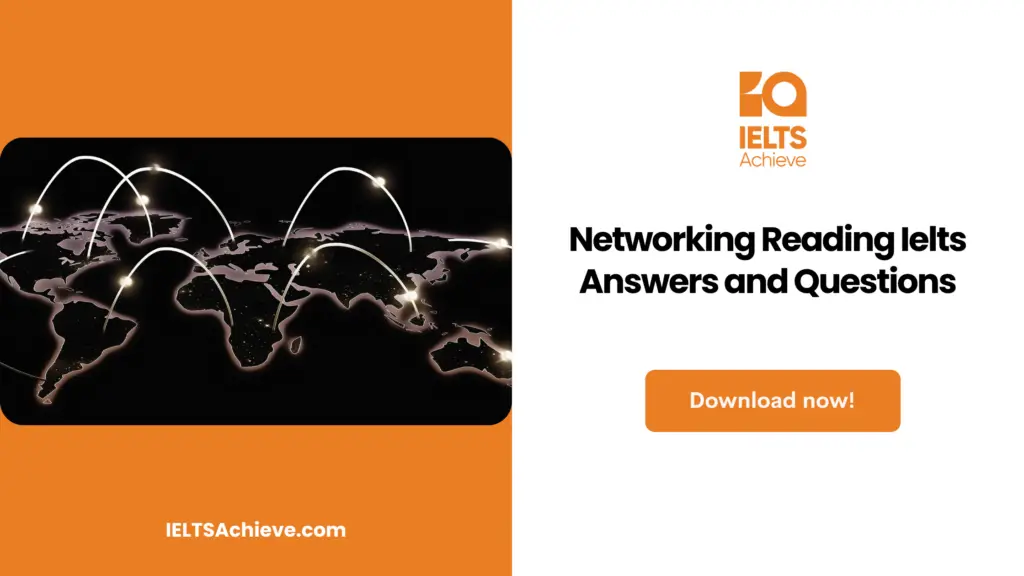The Blog post contains the following IELTS Reading Questions:
- IELTS reading yes no not given
- IELTS reading sentence completion
- IELTS reading short answer question
Stay informed and prepared for success – Explore our comprehensive Reading Test Info page to get valuable insights, exam format details, and expert tips for mastering the IELTS Reading section.
IELTS Reading Passage: Networking

Networking
To be certain, the idea of networking has been given a gloss of modernity that isn’t entirely warranted. It’s widely acknowledged in the business community as an indispensable resource for today’s global entrepreneurs. The idea is widely celebrated, not just in the corporate sector.
There are two types of people in the world: the ones who keep their information and connections to themselves, and those who are willing to share both. An insecure person is not a good networker since they have difficulty connecting with others, whether they be strangers or friends. The prototypical networker has enough confidence in themselves to introduce people they know, even friends, to each other. A businessperson or academic might make a connection with someone who could prove useful down the line, but at the moment, it might help them to meet another associate.
A very self-assured person needs to bring these people together and allow a connection to grow without his being involved. For those who don’t regularly participate in online social networks, this kind of change can feel like an unbearable intrusion of others’ freedom. The sad part is that the person who made the first contact would stand to gain the most if he knew the full story. How come?
Because, all else being equal, people tend to socialize within preexisting networks, and any given individual has the potential to be dragged into ever-expanding spheres of new contacts. It’s been stated that as long as you have eight friends, you’re connected to everyone on Earth. As more people share their knowledge, the potential of any endeavor becomes obvious.
While it’s true that expanding one’s professional and personal networks can lead to great success, it can also bring up unexpected challenges. To put it another way, it broadens one’s horizons. While this isn’t always a bad thing, it does increase the pressure on the networker to expand his sphere of influence constantly. It may seem like the easiest solution to just cut ties with old acquaintances, but this would be a mortal sin for our networker because it would be counter to their stated goal of expanding their professional network. The reaction of acquaintances and friends is an additional issue. When one spreads themselves too thin, they have less time for the people who were once close to them. It’s not uncommon for this to lead to jealousy and conflict among coworkers and even between leaders and subordinates in the office. If you work for an insecure manager, their jealousy and envy could backfire and cause them to try to impede or even block your professional advancement.
To solve this problem, one must allow one’s superiors to participate in the glory and offer them some solace. This kind of management is sometimes referred to as “bottom-up” leadership. In today’s business environment, cooperation between companies and enterprises is essential to success. As the pace of globalization quickens, businesses need to be able to operate across more than just national borders. Despite how much pushback this trend receives, it appears to be here to stay for the time being. Specialty businesses can’t thrive without connections and cooperation. For the computer industry to succeed, businesses must collaborate to ensure that their products are compatible with a wide range of available computers. In today’s interconnected world, no organization can succeed without collaborating with others. It used to be easier for businesses to strike off on their own, but times have changed.
The same holds true in the academic world, where knowledge and understanding have traditionally been guarded with extreme caution. Recently, there has been a widespread trend of universities and colleges opening their doors to the outside world, which has had significant positive effects on business and academia. The stereotypical academic is someone who operates in an air of rarified sophistication, living in glorious isolation as a captive of their own intellect. This individual doesn’t have a natural place in today’s networked world. It’s true, though, that even the most closed-off societies evolve. With increasing frequency, academics are leaving their isolated ivory towers to form partnerships with the business and government sectors, producing surprising results in places like Silicon Valley in the United States and the area around Cambridge, England, which is home to one of the densest concentrations of high-tech companies in Europe.
Call them what you will—networkers, wheeler-dealers, movers, and shakers—they are the ones who keep the world turning. Between 35,000 and 40,000 B.C., Homo sapiens emerged as the dominant species, bringing with them the ability to conceptualize thought abstraction and culture, which are intrinsically linked to planning for survival and productivity in humans, and thus causing widespread upheaval in the Neanderthals’ already unstable world. The weak will gain power, so the saying goes. But, will they?
Unlock your full potential in the IELTS Reading section – Visit our IELTS Reading Practice Question Answer page now!
Recommended Questions:
Renewable Energy IELTS Reading Question with Answer
Networking IELTS Reading Questions
Questions 1-5
Do the following statements agree with the information given in the Reading Passage?
For the questions 1-5 on your answer sheet, write:
- YES if the statement agrees with the writer’s claims
- NO if the statement contradicts the writer’s claims
- NOT GIVEN if it is impossible to say what the writer thinks about this
Example Answer In this context, “networking” is a theoretical concept. Yes
- There are basically two types of people in the world.
- The prototypical networker has high health and robust physicality.
- Networking is not a new phenomenon.
- A person who is willing to open up and connect with others is more likely to succeed in the world of networking.
- In the business world, networking is a sign of status.
Want to excel in identifying the writer’s views and claims? Click here to explore our in-depth guide on how to accurately determine Yes, No, or Not Given in the IELTS Reading section.
Questions 6-10
Using NO MORE THAN THREE WORDS from the passage, complete the sentences below.
6. Specialized companies won’t last long unless they have ………………………………………
7. If a manager is …………………………………….. at work, it can lead to issues.
8. These days, the success of …………………………………….. depends on a team’s ability to work together.
9. A supervisor has the power to limit an employee’s advancement or even…………………………………… it entirely.
10. Meeting new people …………………………………., but it also has drawbacks.
Enhance your sentence completion skills in the IELTS Reading section. Click here to access our comprehensive guide and learn effective strategies for filling in missing words or phrases in sentences.
Questions 11-15
Using NO MORE THAN THREE WORDS from the passage, complete the sentences below.
11. Which personality type has the hardest time becoming a modern networker?
12. Which area of society is more protective of its ideas?
13. So, who exactly took the place of the Neanderthals?
14. Where in Europe can you find one of the highest densities of technological corporations?
15. When compared to other creatures, what distinguishes humans the most, except our intelligence and ability to think abstractly?
Unlock your full potential in the IELTS Reading section – Visit our IELTS Reading Practice Question Answer page now!
Recommended Questions:
Renewable Energy IELTS Reading Question with Answer
Networking Reading Answers
1. Yes
2. Not given
3. Yes
4. Yes
5. No
6. Co-operation and contacts
7. (very) insecure/jealous/envious
8. Companies and enterprises
9. Block
10. Brings success
11. Stereotypical academic
12. Academic world
13. Homo Sapiens
14. Cambridge/around Cambridge/Cambridge in England
15. Culture

We hope you found this post useful in helping you to study for the IELTS Test. If you have any questions please let us know in the comments below or on the Facebook page.
The best way to keep up to date with posts like this is to like us on Facebook, then follow us on Instagram and Pinterest. If you need help preparing for the IELTS Test, join the IELTS Achieve Academy and see how we can assist you to achieve your desired band score. We offer an essay correction service, mock exams and online courses.

